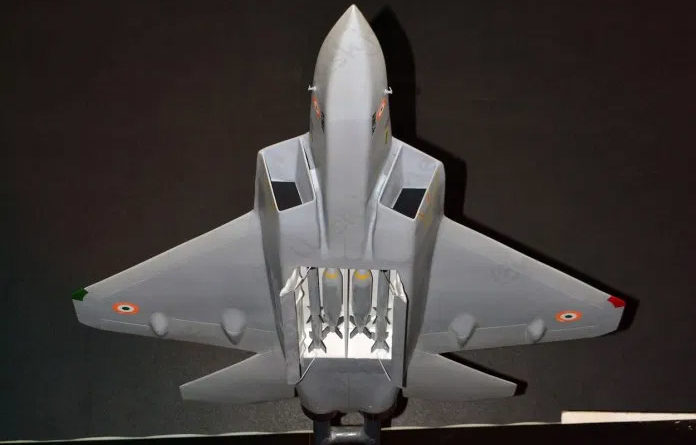Defexpo: India’s AMCA Stealth Fighter Can Operate In Manned and Unmanned Modes
February 5, 2020
The expected funding for the AMCA’s development could be in excess of Rs 10,000 crore
India’s inspiring attempt to develop a ‘5.5. generation’, twin-engine, single-seater, multi-role fighter—the Advanced Medium Combat Aircraft (AMCA)—will enter a crucial phase with the detailed data-generation process for making prototypes set to begin in the second half of this year. At DefExpo2020, models of the AMCA in stealth and non-stealth modes are being displayed at the DRDO stall.
This state-of-the-art supersonic beast is expected to fly with loads of homegrown, gen-next weapons currently under development at various laboratories of the Defence Research and Development Organisation (DRDO).
The AMCA, which can be operated in manned, unmanned, stealth and non-stealth modes, carries many advanced technologies making it lethal and apt for dangerous missions.
The sanction for the design phase of the AMCA was accorded in December 2018 with an allocation of over Rs 400 crore after successful completion of conceptual design and feasibility. Ahead of this, over Rs 90 crore was allocated for the feasibility study.
The AMCA is being designed and developed by the Aeronautical Development Agency (ADA).
Sources privy to information about this highly-sensitive programme confirmed to onmanorama that the design phase is nearing completion.
The scientists have made few changes to the AMCA design and are now focussing on fine-tuning plans ahead of wrapping up the design phase.
In the next two to three months, the design for AMCA will be completed. ADA plans to develop five AMCA prototypes and will be seeking the government approval towards the end of this year.
The sanction will be critical for making the prototypes, flight testing and configuration.
While the final cost is still being worked out, the expected funding could be in excess of Rs 10,000 crore. The first few prototypes will be to check the stealth systems on board AMCA. Advanced technologies will be progressively introduced into the prototypes.
AMCA will be embedded with the diverterless supersonic intake (DSI) system for its engines that would give it more stealth and better performance in supersonic flight.
“Futuristic weapons pack, including those capable of delivering high-energy hits, will make AMCA a dreadful flying machine. It will carry cruise and many air-to-air missiles,” says a source.
In non-stealth mode, there will be 10 weapon stations. With one mid-air refuelling, AMCA will be able to fly distances that are really long.
The fighter has advanced active and passive sensors integrated with electronic warfare suite.
Body-conformed antennas, flushed electro-optical sensors and stealth features ensure that AMCA could fly undetected over dangerous territories.
As reported by onmanorama earlier, the AMCA will be initially powered by a pair of 90kN F414 engines from GE in the US and later by an engine with higher thrust of 110kN, which is yet to be developed. If all blocks fall into place, then the first AMCA prototype will fly by 2025.
Capabilities like suppression of enemy air defence (SEAD) and destruction of enemy air defence (DEAD) and features like in-vehicle monitoring system (IVHM), serpentine air intake, infrared search and track (IRST) and missile-approach warning system (MAWS) will make AMCA ideal for extended missions.
The Indian Air Force (IAF) is backing the AMCA project to the hilt with Air Chief Marshal R.K.S. Bhadauria tracking the developments closely.
“The IAF’s keenness on AMCA is definitely pushing the project with renewed direction,” adds an official.
Courtesy: theweek

